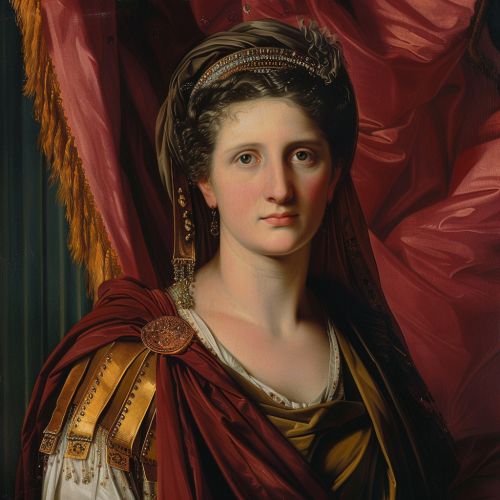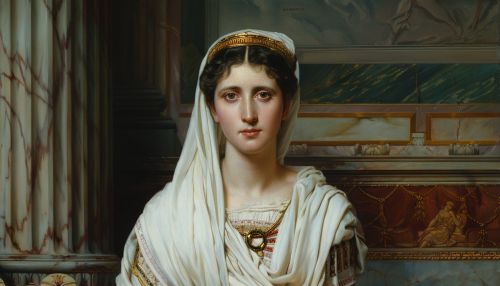Livia Drusilla: Difference between revisions
(Created page with "== Early Life and Family Background == Livia Drusilla, also known as Julia Augusta after her formal adoption into the Julian family, was born on January 30, 58 BCE. She was the daughter of Marcus Livius Drusus Claudianus, a prominent Roman senator, and Alfidia. Her family was part of the Claudian gens, one of the oldest and most distinguished patrician families in Rome. The Claudians were known for their political influence and military prowess, which...") |
No edit summary |
||
| Line 33: | Line 33: | ||
* [[Julio-Claudian dynasty]] | * [[Julio-Claudian dynasty]] | ||
[[Image:Detail-91971.jpg|thumb|center|Portrait of Livia Drusilla, wife of Augustus, in classical Roman attire.|class=only_on_mobile]] | |||
[[Image:Detail-91972.jpg|thumb|center|Portrait of Livia Drusilla, wife of Augustus, in classical Roman attire.|class=only_on_desktop]] | |||
== Categories == | == Categories == | ||
Latest revision as of 19:21, 18 June 2024
Early Life and Family Background
Livia Drusilla, also known as Julia Augusta after her formal adoption into the Julian family, was born on January 30, 58 BCE. She was the daughter of Marcus Livius Drusus Claudianus, a prominent Roman senator, and Alfidia. Her family was part of the Claudian gens, one of the oldest and most distinguished patrician families in Rome. The Claudians were known for their political influence and military prowess, which provided Livia with a strong social and political foundation.
Marriage to Tiberius Claudius Nero
Livia's first marriage was to Tiberius Claudius Nero, a member of the Claudian family. This marriage produced two sons, Tiberius, who would later become the second Roman Emperor, and Drusus the Elder. Tiberius Claudius Nero was a staunch supporter of Julius Caesar and later aligned himself with Mark Antony during the tumultuous period following Caesar's assassination. This political alignment would have significant implications for Livia's future.
Marriage to Augustus
In 38 BCE, Livia divorced Tiberius Claudius Nero and married Gaius Octavius Thurinus, who would later become the first Roman Emperor, Augustus. This marriage was politically motivated, as Augustus sought to strengthen his position by aligning himself with the powerful Claudian family. Despite the political nature of their union, Augustus and Livia shared a deep and enduring bond. Livia became Augustus's most trusted advisor and confidante, playing a crucial role in the administration of the Roman Empire.
Political Influence
Livia's influence extended far beyond her role as the wife of Augustus. She was deeply involved in the political machinations of the Roman Empire, often acting as an intermediary between Augustus and other political figures. Her intelligence, political acumen, and ability to navigate the complex web of Roman politics made her an indispensable asset to Augustus. Livia was also known for her patronage of the arts and her support of various social and religious reforms.
Role as a Mother
Livia's role as a mother was equally significant. Her son, Tiberius, became the second Roman Emperor, and her influence over him was profound. Livia's other son, Drusus the Elder, was a successful military commander who played a key role in the expansion of the Roman Empire. Livia's guidance and support were instrumental in shaping the careers of her sons and ensuring the continuation of the Julio-Claudian dynasty.
Later Life and Death
After Augustus's death in 14 CE, Livia continued to wield significant influence during the reign of her son, Tiberius. She was formally adopted into the Julian family and given the honorific title of Julia Augusta. Livia's later years were marked by her continued involvement in political affairs and her efforts to secure the legacy of the Julio-Claudian dynasty. She died on September 28, 29 CE, at the age of 86.
Legacy
Livia Drusilla's legacy is one of political acumen, influence, and enduring impact on the Roman Empire. Her role as the wife of Augustus and mother of Tiberius positioned her at the center of Roman political life for over five decades. Livia's contributions to the administration of the Roman Empire, her patronage of the arts, and her support of social and religious reforms left an indelible mark on Roman history.
See Also


